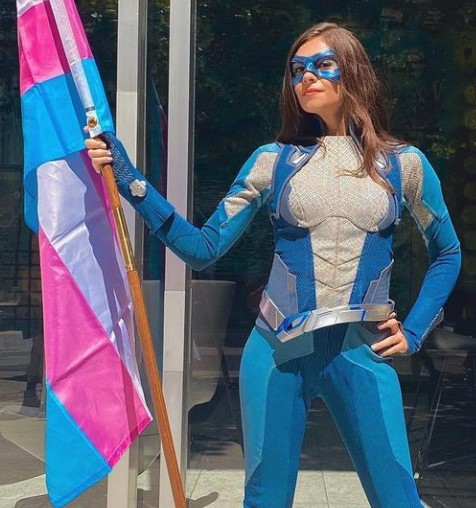Surprise! We’ve got another essay in the Transgender Marxism collection up for discussion.
The PDF is here – https://transreads.org/wp-content/uploads/2021/07/2021-07-15_60f0b3d5edcb7_jules-joanne-gleeson-transgender-marxism-1.pdf
The intro discussion, with links to all the essay discussions is here – https://lemmygrad.ml/post/395378
Tonight’s essay is How Do Gender Transitions Happen? by Jules Joanne Gleeson
Jules Joanne Gleeson is a Londoner living in Vienna. She has performed lectures and stand-up comedy internationally. Her essays have been published widely, including by Viewpoint Magazine, Invert, TSQ, Homintern, VICE, Oxford Art Journal and Salvage. Jules co-founded the Leftovers communist discussion group, has copyedited several Marxist monographs, and is writing a book about logic and hermaphrodites. She enjoys pop music, mystical texts and kettlebells.
As with previous discussions, I’ll be pulling quotes and making notes.
Feel free to join in and ask questions, make comments, learn something together with me!! (No time limit, I will always come back to these, so don’t feel like you can’t chime in just because you found this post like eight months late).
Edit: The next discussion, on an essay by Nat Raha, is here - https://lemmygrad.ml/post/408500


“View 1: transition as mastery over the encounter”
“The first view of transition is an analytic one: it considers gender recognition to be a process that unfolds socially, and which trans people are tasked with doing their best to take command of, using hormones, surgeries, training in posture or speech, their wardrobes, and formal changes to identity documents. It focuses on the evaluative moments trans people go through in considering themselves, and preparing themselves, and in their encounters with the broader world”
This process of transition is one in which trans people take steps to present to the world (or to be read) a certain way. For many people, this is the view of transition most concerned with “passing” though it’s important to note that there are trans people for whom passing is not the goal (or not possible) and people for whom success in this regard would be to “pass” as nonconforming to either of the cis ideas of gender.
“The focus of those pursuing ‘passing’ is both their own form (body, attire, voice, mannerism, word choice), but also interactions with an observer (assumed usually to be cis, and perhaps relatively uninformed on gender affairs).”
This is a self-directed transition, and one which for some is aimed at creating a state of stealth, in which only a chosen few are aware that the trans individual is not cis. Gleeson notes that for most adult transitioners, this would require a radical change in location.
Anecdotally, I live in a relatively small city, where it usual for people to attempt to locate common connections between everyone they meet. This results in a near-impossibility in going stealth, as someone will always know someone who knew you when.
This also leads to situations in which, while someone may be “polite” about transition on the surface, there is almost always gossip out of earshot relaying not only a trans person’s status as trans, but divulging details of connections from the past, including dead names.
Passing is a tetchy subject, politically. Gleeson notes that there are vocal objections to passing as assimilationist (which is very true), but that nevertheless it represents a common desire amongst trans people. I’ll say myself that passing is also something largely reserved for a a select few privileged transitioners, primarily white. There’s a whole discussion to be had about passing and the way it is leveraged to support ideas of transmedicalism.
While passing is often sought as a desire to escape the violence inflicted on trans people, the overwhelming majority of violence is directed towards poor Black trans women. For them, passing is often a matter of life or death. However, passing is also for them farthest out of reach, due in part to the prohibitive expense of passing, the lack of proper medical care, and the very real truth that Black bodies are more heavily policed and are already (for cis people as well) considered to exist on a spectrum of queerness outside of the cishet white normativity of the gender binary.
Arguments can be made that otherwise privileged white trans people who pass (or live stealth)–a mode of existence denied to the most vulnerable trans people–and live in fear of violence generally reserved for the most vulnerable trans people, and choose not instead to leverage their relative privilege to dismantle systems of cisnormative oppression and to fight against assimilationist views of transgender identity that reify passing as the ultimate desire and arbiter of “true transition,” are doing a grave disservice to the cause of queer liberation.
There’s also the small element of self-defeatism that comes from passing, in that the existence of passing trans people is leveraged as fuel in trans panic and can serve to actually increase the danger of violence against trans people.
What follows is an accounting of Natalie Wynn’s (Contra Points) transition, which pretty much shows what I was just talking about. To Natalie Wynn, transition is almost entirely a burden on the transitioner, and that it is up to the transitioner to conform to the cisnormative ideals of the gender binary. In it, she lists the many steps she has and must take to transition, which shows just how prohibitively expensive, and ultimately privileged it is to achieve.
“It’s the net effect of these things – my acquired social position as a woman – that makes it philosophically sound to call me a woman. The minutiae of how I achieve that end are not particularly relevant … The goal of my transition is merely to conform enough to elicit that mysterious ‘seems like a woman’ perception”
Of this, Gleeson says:
“she wishes to be taken as a woman and (in her words) being read as such is the only philosophically sound basis for her being considered one.”
I vehemently disagree with Natalie Wynn’s stance on transition. I vehemently disagree with Contra Points on…a lot of things. But I’m sure that most people around here already have their own opinions on her. It’s important to note that this is just one conception of transition Gleeson is discussing.
This particular stance, that personhood is drawn into being by encounter, or in otherwords, that your observation by an “other” constitutes your identity, is aleatory materialism as coined by Louis Althusser
“Gendered traits can cause a considerable degree of anxiety during the transition process (just as cisgendered men might worry that wearing too much pink attire makes them seem ‘unmanly’, or a cis woman could be concerned a short haircut would leave her face appearing ‘mannish’).”
Throughout our explorations of transition, it is always important for us to remember that the mechanisms which serve to make trans lives so difficult, the enforcement and social reproduction of cisnormative gender hierarchies, are not a uniquely trans phenomenon.
Queer liberation is about the abolition of gender as a class structure, which should be the goal of any Marxist. Only through intersectional examinations of the myriad class structures capitalism has imposed on humanity can we ultimately craft a classless society.
Cis people are, as we spoke about in a previous essay (I want to say the Noah Zazanis one) ultimately the people who have most been subjected to the enforcement of gender classes. Who, through social reproduction of gender and through the punishment for nonconformity, have arrived ultimately at a cisgender identity with all of the restrictions on self-expression that entails.
“However, in most cases trans people will encounter immutable features they are unlikely to be able to do anything much to alter (the hip bones of trans men who transition post-puberty or the ribcages of trans women are two common examples).”
Rib cages??? I have never heard this one. Are people spending time worried about their rib cages? What’s that about? I have never…noticed any sort of deviation between a trans woman’s rib cage and a cis woman’s rib cage. Nor between the rib cages of cis men and cis women. Just never crossed my mind. Has anyone else encountered this?